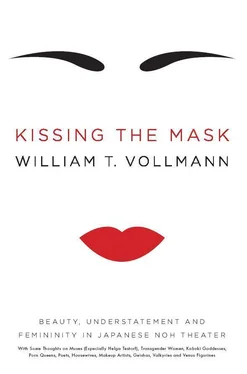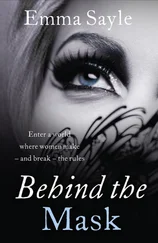Of course, some of this must be ascribed to Japanese modesty and understatement. She frequently expressed her gender through the Japanese housewife’s conditioned reflex of tidying and cleaning, which had grown so deep-seated that she was scarcely aware of it. And here it is worth inserting that the Japanese-American woman whom I have quoted (“American woman is more confident about the body”) perceived personality as a much more mutable quantity than did Sachiko or I. In fact, the Japanese-American woman said: “Gender personality is different. There is a social expectation for man and for woman. So when they are growing up they acquire some personality” — for instance, the conditioned reflex of the Japanese housewife. She decidedly believed that personality could alter over time. All the same, she was willing to categorize: “General female personality is emotional and easy to get hurt. General male personality is more rational because in the cases they encounter, emotion is not involved. When they decide something, they can be more rational. When women decide something, they try to be rational but cannot.”
Sachiko was perhaps more rational than I, but no less inclined to be hurt, which sometimes occurred as silently as when the rainbow curtain ascends to admit the shite onto the bridge to our world.
Could I say I understood her? What would it require to know her? How many allusions, antecedents, texts would it take? If she came with me to Kasuga Shrine, which gold clouds and spiderwebs would lead me to whatever lay behind her mask as she stood smiling politely at me on that mossy path of stone lanterns where Lady Nijo once walked? To whom and what does a person refer? — To her parents, of course, and her lovers and children, but then? To the idea of the Emperor, as in Mishima’s case? — Certainly not in her case. (But before atomic persuasion brought about the Japanese surrender, Sachiko’s mother had believed that the Emperor did not urinate. He was a god.) To the physical necessities of breasts, periods and menopause? To Heian reverberations? Sachiko was quite good at naming and placing ancient poems. What is a woman to me? What can she be, but other ?
THE BYZANTINE
Marina Vulicévic was a reporter in Beograd. She had huge dark eyes. We met several times. She and I both felt at ease being open with one another, and when I asked her those three questions she was generous enough to describe her three beings to me.
“Who are you as a soul?”
“I agree with Plato: Our soul comes from the unknown place, the clean place. Maybe before, you are in a very nice huge place and then God comes out and shows Himself. And then that soul reaches for the future or for a certain person. I believe in eternal life, because it would be stupid if this were the only life. In my feeling, the soul lacks all gender, all it needs is to love and be loved, and to swallow love — but not just love made of sex, which is material. — And there is something inside the soul which neeeds to go out… Maybe I have an equal quantity of female and male inside of me.
“I think about my soul only in relation to someone else,” the Serbian woman continued. “When you feel very lonely and sad, people can always hurt you. And yet there is something I need to believe is eternal. Now that my parents are dead, I need to be with them sometimes. I would give my life just to be with them for a few minutes. There is one moment in the day when you feel so free and clean and fresh that you can forgive even your own killer. This happens maybe when you hear a certain kind of music, or when you are alone in church. Before, I went every Sunday. Now I go only when there is a holiday. When I feel especially alone I go to the icons and feel comforted. I have one from Jerusalem: Saint Marija.
“I am a Byzantine. I love, and I suffer for it. You are a Western type. You love just for your own satisfaction. We are something of sad persons, because of our own Byzantine tradition. We are very emotional, very sensitive.”
“Who are you as a person?”
“I’m still a little girl inside, afraid she will be left alone, rejected. One time I was travelling with my parents, and there was only one seat in the train compartment, so they left me with perfect strangers. All through the voyage I was afraid that they would leave me. Sometimes I feel like that; I feel that I’m going to be alone. At home I still have my toys and my brother’s toys, his little automobiles, and I still keep them. I sometimes feel that it’s better that my brother and me should stay kids, without problem. The other part of me wants to have a husband and a child, but I’m also afraid. I want something but I’m afraid of wanting something.”
“Who are you as a female body?”
“When I was with my boyfriend G., he told me he felt like a real man with me, and in my body, my female body, when he would say animal female , you are a real female , I would feel very female. He bought me some pantyhose and wanted me to wear them. I didn’t mind it; it felt nice. I liked to please him in different ways. Sometimes he wanted me to bathe him. I liked to prepare a meal for him. It felt nice to be to him as a body.
“Most of the time I feel good about my body. When I was a little girl I went for ballet lessons. I like that feeling of working out, of calm, of drifting away, a nice feeling after the pain. Sometimes in life I feel a need to make something of a problem, and when I solve it I feel the same as after taking off tight shoes. I feel relaxed and in ecstasy.”
“Why do you wear tight shoes?”
“I hate wearing them, because if you stand a lot, they start to hurt you. But the only nice thing is that sometimes I wear those high heeled shoes; I feel I should have them because I want to be noticed. What I especially liked when I was with G., he had special white slippers for me and I wore those with his white socks. I also wore his T-shirt to sleep.”
So who was Marina? And if I had seen her step into her tight shoes, would I have felt as I did when watching Mr. Umewaka gazing at his masked face in the mirror room of Yasukuni Shrine? Who was he as a soul, and who was I? If I could discern Marina’s soul in isolation, would I know her to be a woman, or would I conclude, as she, Hilary and Sachiko all had, that the soul is ungendered? Did Mr. Umewaka’s soul alter when he put on a waka-onna mask? Whenever I considered my soul, I imagined something shy, clean, young, pertaining to a small boy. I had accordingly expected the three women to have girl-souls, especially since I believed the abyss to be exactly as Hilary had formulated it. Its existence used to exasperate me. Now I found that the possibility of its nonexistence unsettled me.
Chapter 11. What Is Grace?
A List and a Possible Hermeneutic
How to cross the abyss, if it does exist? Can we even describe what we see, much less what to look for? Just as one can be moved by the grace of “Kiyotsune” without necessarily possessing a substantial conscious understanding of Noh’s gestural and thematic vocabulary, so one can be conquered by a woman’s face and form, yet fail to articulate just what makes her beautiful.
Artists try to do so nonetheless. Here is one of Kawabata’s many expositions of qualities, from Beauty and Sadness : “Some Japanese women have fair skin glowing with femininity, perhaps even finer and more lustrous than the faintly pink glowing skin of young girls in the West. And the nipples of some Japanese girls are an incomparably delicate shade of pink.” In Snow Country the word most frequently employed in praise of the heroine, a hot springs geisha named Komako, is “clean.” “The high, thin nose was a little lonely… but the bud of her lips opened and closed smoothly, like a beautiful little circle of leeches… With her skin like white porcelain coated over a faint pink, and her throat still girlish… the impression she gave was above all one of cleanliness, not quite one of real beauty.” And yet of course she is beautiful. Enervated though he is, the protagonist remains obsessed with her. “The smooth lips seemed to reflect back a dancing light… Her eyes, moist and shining, made her look like a very young girl,” and her skin reminds him of “the newness of a freshly peeled onion or perhaps a lily bulb… More than anything, it was clean.” “In the moonlight the fine geishalike skin took on the luster of a sea shell.” Finally and most relevantly to our concerns, we read that in starlight “Komako’s face floated up like an old mask. It was strange that even in the mask there should be the scent of the woman.”
Читать дальше












